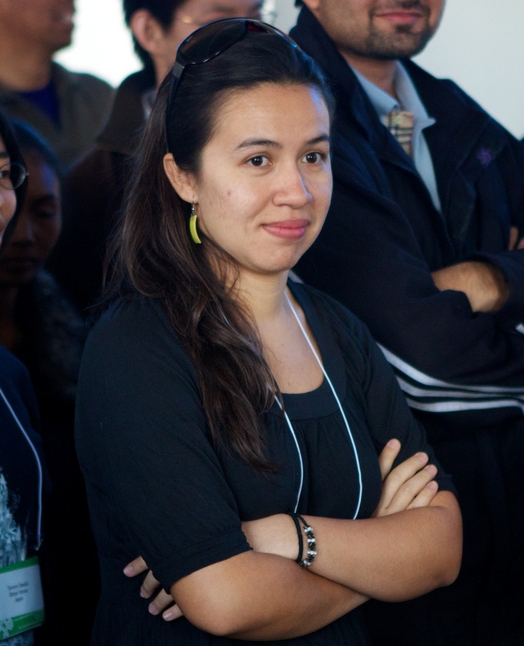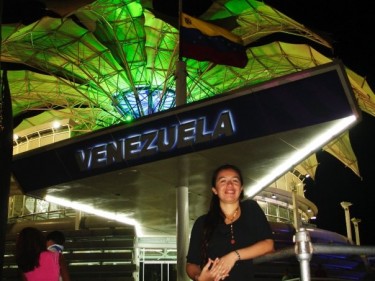The team of translators at Global Voices in Spanish is the largest of the various Lingua teams, and yet little is known about the people who make up the group. At this point I must make the appropriate mea culpa, admitting responsibility, and of course, remedying the situation. Thus, I present, with more than 1800 translated posts, one of our star collaborations. I had the opportunity, as several other GVers, to meet her in person in Santiago during our Summit this year, and as expected, the first time we met we treated each other as life-long friends. For those who do not have that privilege, here is Adriana Gutiérrez [es]:
Hi Adriana, people say that a good translator must go unnoticed, but we'd really love to know more about you.
Well, I am Venezuelan by birth and habit. For the last 10 years I've been a graphic designer, a freelancer for 1, married to another graphic designer for 18 months and a loving fan of my dog, music, internet and film… in that order. I also like reading, mainly novels of epic fantasy, suspense and magic realism (the latter has always seemed very typical of Latin America to me). I have few friends, perhaps because I'm shy, perhaps because I'm unfriendly (or both), but do not be fooled by appearances, there is no “seriousness “about me.
Tell us about your experience as a designer.
As a designer I have been closely linked to the advertising area. Since I graduated I've had plenty of work, thankfully, and most of the time in advertising agencies in the city where I live. Eventually these jobs ended up boring me (they are cyclical and most agencies work in the same way), so over a year ago my husband and I decided to risk creating our own design studio and although it has been a little hard (like every beginning), we've also had plenty of work as independent designers. Go and check out our Facebook page and see some of our work… please don't be too cruel with the criticism hahaha.
What about your blog and other things you have online?
My blog is Bitácora Invisible [es] (Invisible Blog) (since 2005) and is a personal space where there is a little bit of everything (literally), anecdotes, thoughts and photographs, and I write mostly in Spanish. That space was on stand-by for a couple of years, coincidentally during the time when my Twitter account (@Adri021) and Tumblr began to grow… but recently I wanted to take up the habit of writing on it and already have a few new entries. I have a podcast about movie soundtracks, also in Spanish, but because of my work it got stuck on the 28th episode and the 29th is still one of my pending tasks. And there's my Flickr, as varied as my blog. Ah! Sometimes I also collaborate with some friends who are slowly engaging in the production of viral videos, and there are a couple of pieces on YouTube as El Jefe se entera… [“The boss finds out…”, a parody of Hitler finds out about a video meme, in Spanish] and CollowFriday [a parody of the FollowFriday videos on Twitter, in Spanish].
Being a professional designer, where do you get your interest and skills as a translator?
I liked languages since I was a child, while taking English classes I liked to translate (short) texts or songs to learn more and every time I increased the amount of translated text. Then, knowing blogs around the world, sometimes I wanted to share some things I read, but I knew that some of my contacts didn't understand English, so I translated the articles… then I got to GV… the rest is history.
Would you share that story with our readers?
Sure. Since I started my blog I was fascinated by the potential of communication and expression of the media, then in 2007 I found out about Global Voices Online thanks to Luis Carlos Diaz, where he worked as a writer and translator for the Spanish version. He echoed a call from the editor to capture volunteer translators and I heeded his calling, attracted by the idea of taking all this compilation of local stories to a wider audience. Since then I have not stopped working with the project, I may have come down a bit in frequency, but the truth is that my interest in GVO/Lingua has not diminished one cubic millimeter… I think it is as Leonard [Chien] says, the relationship between Lingua and its translators is like a love story. The issues I translate have always been very varied, but although I'm attracted to posts on the Environment, Culture and Cyberactivism, I prefer to give some diversity to my translation “time line” and carry different types of stories to readers at GV in Spanish.
You've been translating for GV for over three years, what would you say to those just starting out?
Tough question, let's see… I'll speak from my own experience to better illustrate what it has been like working in GV (and what it could be like for beginners): For me, GV/Lingua has meant having the world closer, and I don't mean it as a physical space but as being closer to people, leaning about the realities of different places at once, told by the main characters themselves, without “makeup” or other interest to express what they're living/feeling. At first I began to translate with a “selfish” idea: What would I like to read in a site like GV? and starting from there I chose the entries to translate, each of these translations were making me want to know more and more about those stories, as I said, the reality of other places… somehow, knowing that my own interest in learning helps certain stories reach a wider audience, is a special added value. So far I don't see GV as an obligation, it is difficult to see it that way when I can devote to it on my own terms, without schedules or a tight agenda and with a peer group always willing to contribute something more to the work of others.
Venezuela has become a little bit of a “complicated” country, how do you see it from within?
More complicated (because I live here)! In Venezuela, from my view, a very negative social and ideological division has grown and it largely prevents reaching agreements for the majority and has helped citizens become reactionary and even violent. There is also the lack of organization and balance in the current administration, there is often no consistency between what is said (which in theory seems very positive) and what is done. Offering opportunities for advancement and growth to those who historically didn't have them (this is very good), but doing it in a messy way, uneven and not very transparent, so the results end up being insufficient or even harmful for most… repeating the vices of the previous administrations, which they criticize. Venezuela remains a beautiful country with people who want to do things right, only that for the moment we're walking uphill…
Tell us about the city you live in.
Barquisimeto is the city of twilight (that's why there are so many pictures of twilight skies in my Flickr account), a growing city that has so far managed to balance concrete and nature. In Venezuela it is known as the “music city” because of the many talented musicians that come out of its land (the most recent and notorious example is the master Gustavo Dudamel, Director of the Los Angeles Philharmonic) …in fact, one of the best training academies of the System for Children and Youth Orchestras of Venezuela, recognized and replicated throughout the world, is in Barquisimeto. If there is something that the city has is that, although many of us weren't born here (I was born in Merida, a city of the Venezuelan Andes and several of my friends are from other cities too), we feel so “guaros”* as anyone born in this locality. (*) In Venezuela, they call “guaro” people born or living in the Lara State, whose capital is Barquisimeto.
What can you mention about Barquisimeto that is particularly attractive or that you like?
Although many people here say that in the city there is nothing to do, I think that is a baseless complaint. Barquisimeto and the surrounding area has it all: Nightlife, constant cultural shows, many restaurants (the traditional food from El Roble is special), parks and places to spend the day outdoors… my current favorite place is La Flor de Venezuela [es], a pavilion designed by architect Fruto Vivas to represent Venezuela at the 2000 Hannover Expo, which combines architecture, flora and fauna, as well as cultural information about the country, and within its space is a small restaurant with delicious crêpes. You also have the town of Santa Rosa, where its church houses the religious patron of the region, the Divina Pastora, a history museum, a viewpoint from which you can see Cabudare (sister city of Barquisimeto) and other of my favorite places: a bakery with delicious desserts where they let you draw on paper placemats while waiting for what you ordered.
And how would you describe Venezuela to a foreigner?
Venezuela is a country of contrasts, with very cold or very hot areas (with its intermediates), extreme wealth or poverty, idyllic and unforgettable landscapes, and despite my comment on the “aggressiveness” of our citizens there are still many people with the ability to make a good impression on our visitors… I think there are no “foreigners” here, because from the moment you step on Venezuelan soil (to visit or to stay) you will find people who will treat you as “one of the family”.
I hope to someday test that out Adriana, thank you for the interview.
Thank you.
Gabriela García-Calderón









4 comments
Gracias for this interview Juan – It is lovely to know better about you, Adriana! I never realised we joined GV more or less at the same time and following the same path: a post of a collaborator’s blog – and as with you, it was love at first sight. Keep up the good work, you are doing a brilliant job!
Best
Paula
Thank you Paula!
With such a great team the least I can do is giving my best to collaborate.
Hi, Adriana, I agree with every word you said about our country, I’m a venezuelan and also a translator. I just have a question, did you take any course about translation? I mean, where did you get the necessary skills to translate from?
Hi Merly! Thanks for the comment.
No, I didn’t take any translation course, just English classes and then I started to translate short texts and songs.
I’m kind of a self-taught person in this area… and of course, I’m still learning.